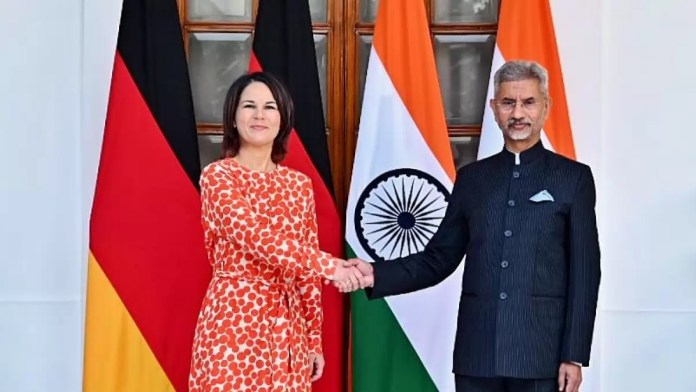Agreeing on multiple issues concerning the world, External Affairs Minister S Jaishankar today reiterated that India could not have talks with Pakistan “while there is terrorism”, addressing a joint press conference with his German counterpart Annalena Baerbock in New Delhi. The foreign minister of Germany landed in Delhi earlier today. During her visit, she will be discussing cooperation on the transition to renewable energy and India’s relationship with Russia and China.
“Regarding Pakistan, I spent some time with the minister outlining the nature of our ties and the challenge of cross-border terrorism, but the main challenge today is that we cannot have talks while there is terrorism. There was an understanding from the German side as well,” Jaishankar said.
Whereas, in a reversal of her comments in October on a role for the UN in resolving the Jammu and Kashmir ‘dispute’ between India and Pakistan, which had led to sharp criticism from the Ministry of External Affairs, Baerbock said in an interview to The Hindu‘s Suhasini Haidar before the visit that she believed this was a “bilateral” dispute.
How Germany and India share geopolitical views
“Today, we have spent the morning exchanging views on the major international issues of the day, apart from our bilateral relationship. This included the conflict in Ukraine, the Indo-Pacific strategic situation, developments pertaining to Afghanistan and Pakistan to some degree Iran and Syria, and each one of us brought to this set of issues our perspectives. I found it very useful, and very rewarding to listen to your perspectives on many matters,” the Indian foreign minister said.
“We discussed multilateral issues. India and Germany interact in the framework of the G4 when it comes to the reform of the UN Security Council. We had a discussion on India’s G20 presidency, which comes just as Germany itself is concluding a successful G7 presidency,” Jaishankar added.
Baerbock said, “India’s G20 Presidency and your presidency in UNSC overlap with our G7 presidency. I would like to thank you for assuming the presidency of G20. You made it clear in our discussion that it’s a very special task. India assuming global responsibility in this difficult moment.”
“I am delighted that India during its G20 presidency with the motto ‘‘’One Earth, One Family, One Future’ is putting a special focus on containing the climate crisis. Thus, highlighting our common responsibility when it comes to climate change,” the German foreign minister added.
Germany-India mobility agreement
Jaishankar and Baerbock inked a mobility partnership pact today, which will make it easier for people to study, do research and work in each other’s country. “Signing of mobility pact between India and Germany is a strong signal of the basis for a more contemporary bilateral partnership,” Jaishankar said as Baerbock responded: “It is important to stay together when the world is facing difficult situations.”
At the joint media briefing, Jaishankar defended India’s decision to import crude oil from Russia, saying that the process was driven by market forces. “From February to November, European Union has imported more fossil fuel from Russia than the next 10 countries combined,” he said. Before she reached India, Baerbock had already said about India’s purchase of Russian oil that Germany understood India’s “economic constraints”.
Taking a cue from Jaishankar’s presentation, Baerbock said that Germany wanted to “bolster security cooperation with India”. “India is a role model for many countries globally,” she said.
On Ukraine, Jaishankar said that India’s position is clear that this is not an “era of war and the conflict should be resolved through dialogue.” In an official statement, the German embassy had said earlier, “Baerbock is travelling to India against the background of the global consequences of the Russian war of aggression in Ukraine.”
A spokesman for Germany’s Federal Foreign Office said that during the two-day inaugural visit, cooperation in the energy transition away from oil, coal, and gas would play a role.
Talking about the challenges posed by China in the region, Baerbock said there was a need to assess the threats. She described the country as a competitor and a rival in many ways. “We now know what happens when a country becomes too dependent on another that doesn’t share the same values,” she said.
Baerbock’s visit will involve discussions to further expand bilateral cooperation in a range of areas including energy, trade, defence and security and climate change.
In a statement earlier, Baerbock had said, “The Indian government has set itself ambitious goals not only in the G20 but at home for its own people. When it comes to expanding renewable energies, India wants to push ahead with the energy transition more than before. Germany stands by India’s side”.
Ways to expand bilateral economic engagement and defence collaboration figured prominently in a meeting last month between Prime Minister Narendra Modi and Chancellor Olaf Scholz on the sidelines of the G-20 summit in Bali.
Other sectors of cooperation
The embassy had informed the press that Baerbock would visit projects for renewable energies and sustainability in the rural surroundings of New Delhi. “In Baerbock’s talks with her Indian counterpart, Subrahmanyam Jaishankar, India’s relationship with China is likely to be discussed in addition to the Russian war against Ukraine and its consequences, for example in the energy sector,” the statement read.
According to the spokesperson, the German minister will visit the Election Commission of India too. “Meetings are planned with representatives of civil society and non-governmental organizations working for women’s rights. India, the world’s largest democracy, took over the presidency of the G20 group of leading economic powers on December 1,” the statement added.
The spokesperson said further that the minister will participate in a trilateral India forum of the transatlantic foundation German Marshall Fund, which is about cooperation in the Indo-Pacific region.
The forum is an annual meeting of American, European, and Indian experts from politics, think tanks, and business at different locations. It has developed into a leading platform for transatlantic and European dialogue with India.
The visit comes just days after the announcement that German Chancellor Olaf Scholz will likely visit India twice in 2023. Chancellor Scholz will look to make a bilateral visit to India in advance of the G20 Summit to be held in India in 2023.




You must log in to post a comment.